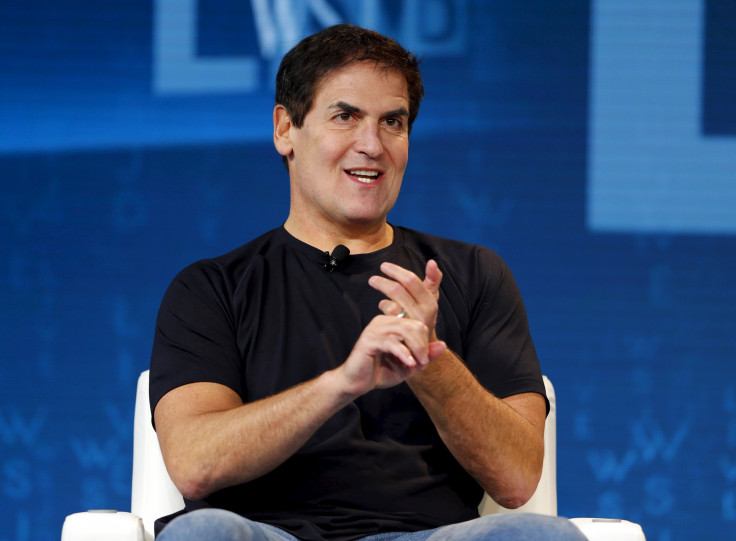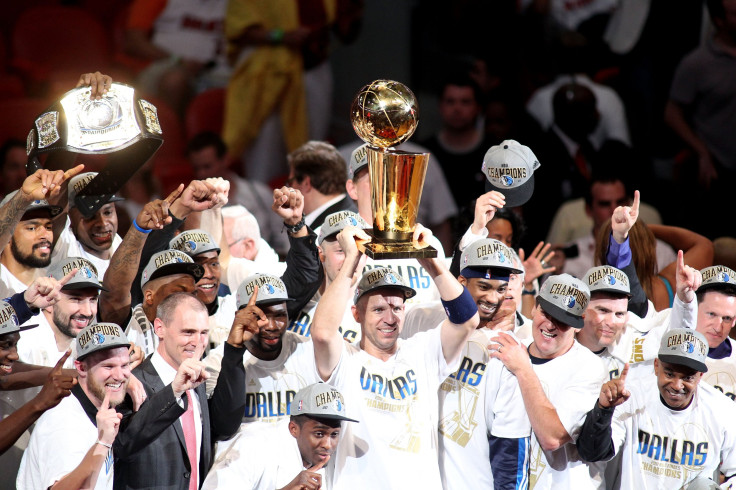Mark Cuban Funding Research On Whether Human Growth Hormone Can Help Athletes Recover From ACL Injuries

Beneath the dizzying debate over Peyton Manning’s alleged connection to human growth hormone hides an important medical question: Can HGH actually hasten athletes’ recovery following an injury or surgery? If so, fans may someday see their favorite stars return to the field or court more quickly after an injury. And today’s already lucrative business of manufacturing HGH for a handful of rare medical conditions, which tallied sales of $1.4 billion in 2011, could swell to even greater heights.
This equation has piqued the interest of at least one investor with a head for both sports and business: Mark Cuban. The billionaire owner of pro basketball's Dallas Mavericks is sponsoring a two-year study to see whether HGH could help athletes recover from anterior cruciate ligament (ACL) injuries, such as the one that recently benched Brooklyn Nets point guard Jarrett Jack for the rest of the season.
More than 200,000 people a year suffer from torn ACLs in the U.S. alone. The muscles in the immobilized legs of these athletes quickly atrophy in the weeks following their injury. They can permanently lose 30 to 40 percent of their leg muscle as a result. And most suffer arthritis later in life.
Christopher Mendias, a physiologist and athletic trainer at the University of Michigan, is investigating whether patients who are injected with HGH and undergo surgery for a torn ACL recover more quickly and completely than those who receive a placebo. Mendias approached Cuban about funding the study after reading an EPSN article about his interest in HGH. The Mark Cuban Foundation spent just under $1 million to support it.
Questions about the medical value of HGH as a post-operative recovery tool were recently stirred up when Al Jazeera aired a documentary about doping in American sports. The film accused the wife of Denver Broncos quarterback Peyton Manning of receiving HGH shipments in 2011. Manning underwent multiple neck surgeries that year, and the report prompted speculation that he used HGH to speed his recovery. He has denied that he ever took the hormone, which is banned by the NFL.
Mendias thinks HGH's possible benefits have largely been ignored by the same sports leagues that ban it because any positive effects could complicate the question of how the hormone should be regulated. “The data we have suggest HGH is at best a relatively weak performance enhancing drug, but it has a lot of potential to help injured tissues regenerate,” he said. “If HGH does work in this fashion, it would be rather unethical to withhold a treatment.”
Many substances such as marijuana and even caffeine were historically shunned or stigmatized long before their potential medical value was fully understood. HGH plays an important role in promoting development, processing fats and manufacturing bones in both children and adults. The Food and Drug Administration has approved it as a treatment for a handful of rare conditions. Still, Cuban believes there may be legitimate medical uses for it that remain unknown.
“Working together could lead us from the path of demonizing HGH and even testosterone towards a complete understanding,” Cuban told USA Today Sports. “It could allow us to make a data based decision rather than the emotional decision we are currently making.”

Cuban has been a strong proponent of the need to parse truth about HGH from fiction. He once asked the NBA Board of Governors to fund research on HGH. Last week, following the Al Jazeera report, he called in on a TMZ Sports show to argue why elite athletes should be permitted to use HGH if it is proven to aid their recovery. He compared it to Lasik eye surgery and so-called Tommy John surgery, common among Major League Baseball pitchers, in which an injured ligament in the elbow is replaced with a tendon taken from the forearm.
Many professional sports leagues including Major League Baseball, the NFL and the NBA have banned HGH out of concern that it could give athletes a competitive advantage. Studies investigating those claims have produced mixed results. Some research has shown that taking HGH can increase muscle strength though other studies indicate that it cannot.
In 2010, Australian researchers funded by the World Anti-Doping Agency published the first data demonstrating that athletes who took HGH performed better as a result. On average, sprinters who took HGH shaved 0.4 seconds off of their sprint time. However, the researchers did not find any similar effect for weightlifting, jumping and overall fitness.
Dr. David Clemmons, an endocrinologist at the University of North Carolina, said HGH was unfairly included in widespread bans by sports leagues amid rising concerns over steroids and other performance-enhancing substances. "Once they let one thing in, it becomes impossible not to let 50 things in," he said. "I think the main reason these bans extend to HGH is not based on scientific fact but 'Gee, we'd better cover anything anybody ever abused or we're going to look bad.'"
Once complete, Mendias’ study will be the best evidence to date about the impact of HGH in recovering from connective tissue tears in humans. Clemmons said other studies suggest patients whose movements are severely restricted could benefit a small amount from HGH in their recovery. One previous study in rats found that HGH did not seem to improve a torn Achilles tendons.
In the University of Michigan study, patients will receive either an injection of HGH or a placebo a week before their surgery and continue to receive it for five weeks following the operation. They will stop taking it long before they return to any athletic activity. Mendias hopes that HGH will help patients maintain more of their original muscle mass, perhaps losing only 10 to 15 percent during recovery rather than 30 to 40 percent.
In addition to preserving muscle mass, Clemmons said there's another way that HGH injections may help to quicken an athlete's recovery from a torn ACL. The hormone is known to speed the process by which damaged muscles break down. "Basically what you get is a new muscle quicker and that may actually help in recovery," he said.
If the new results are promising, Mendias will recruit more patients into a phase III trial, which has not yet been funded. If that one also shows positive results, the collaborators would most likely need to seek FDA approval for HGH to treat injuries. Only then would it officially be lifted from the banned lists of major sports leagues.
In addition to completing this investigation, Mendias also hopes to launch another study in April that examines whether HGH injections can treat chronic patellar tendinopathy, also known as “jumper’s knee.” Realistically, the medical world is still “at least a decade away” from using HGH to treat any kind of severe knee injury, he said.
© Copyright IBTimes 2024. All rights reserved.




















